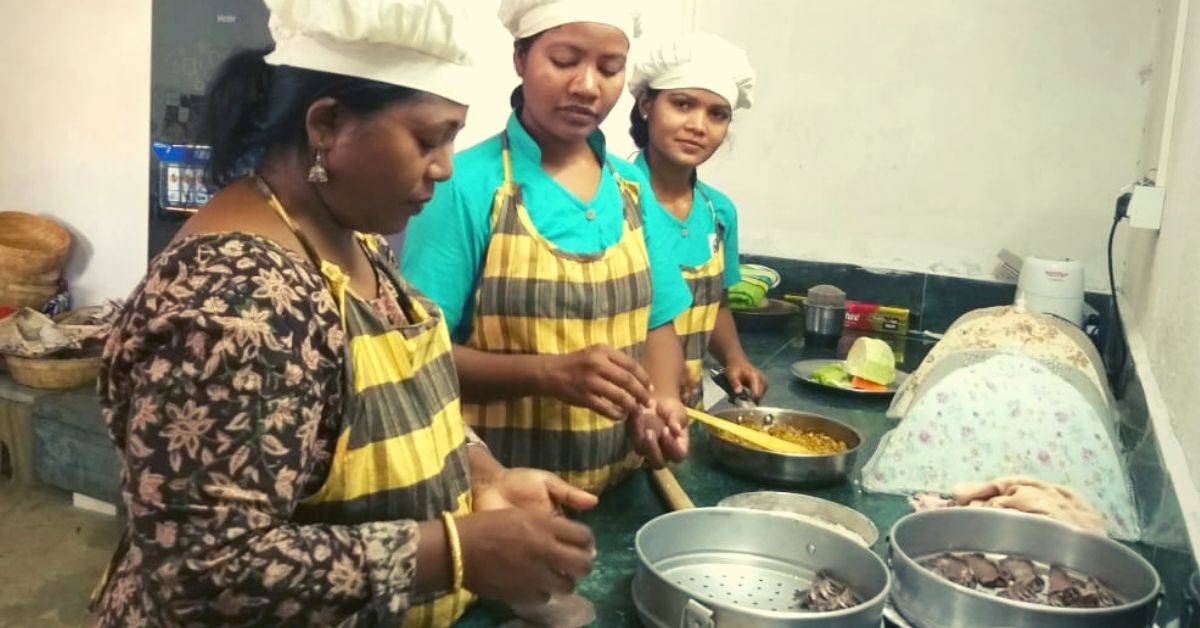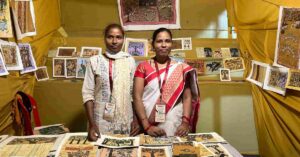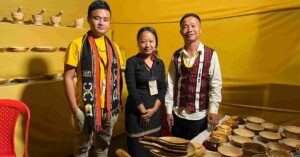Rice Tea to Millet Momos: This Woman Is Reviving India’s Tribal Culinary Gems
Aruna Tirkey’s mission isn’t just about preserving the past: It’s also about using forgotten indigenous food to imagine a more sustainable future. #FoodSecrets

“Every time you eat food, you are not just tasting the dish, but also experiencing the culture of its source community and its evolution. It is true when they say that food indeed is a mirror to the society,” shares Aruna Tirkey, explaining her deep relationship with food that led her to start a unique project, Ajam Emba.
Tucked away on the sidelines of the busy Kanke road, in Ranchi, Ajam Emba, which means tasty and healthy food in Kudukh, the language spoken by the Oraon people, looks and feels like a regular restaurant.
However, there is more to this unassuming place than meets the eye.
Back To The Roots
From preparing forgotten indigenous recipes to cooking in earthen pots over wood fires, and serving on leaves of native plants, Ajam Emba is trying to revive the lesser-known sustainable and simple rural life of the hinterlands, at the heart of Jharkhand’s capital.
It wouldn’t be far off the mark to call it a museum of the region’s culinary culture, but unlike most museums, you can touch it all and eat it too.
Aruna is a former rural development professional, who started this restaurant-and-catering company hoping to popularise India’s tribal cuisines and indigenous flavours among the urban populace.
“My former career took me to remote areas across different parts of India, where I was exposed to the growing disintegration of tribal food culture. It was painful to see this, and I decided to do something about it. As Jharkhand is my home, I decided to begin from here itself,” says Aruna.
She slowly shifted her focus towards the revival of indigenous food through participating in fairs, exhibitions, school demonstration, and even setting up roadside stalls. This went on for five years before she opened Ajam Embe in 2018.
Whether it is the fermented rice tea or traditional delicacies like sanei phool, jute flower curry, or marh jhor—herbs cooked in the starch of brown rice—all the dishes on the carefully curated menu are unique and authentic.
A Movement in a Bite

A native of Jharkhand’s indigenous Oraon community, Aruna shares how she grew up eating millet as a staple grain. The gradual transition to rice and wheat also affected the community and endangered many of their heirloom recipes.
“My parents were school teachers, and I am one of the 12 children they had. Both of them slogged hard to raise a large family, so eating local food based on the use of local resources was an affordable and healthy option for us,” she adds.
After years of being ignored and labelled as food fit for animals, millet is back. However, its revival is tinged with a hint of sadness for Aruna because she believes that it is not the food for the masses anymore.
“Although urban supermarkets are advertising it as an organic and healthy alternative, the steep prices make it inaccessible, which on a larger scale might curtail its comeback. Ajam Emba, at this juncture, is a step to bridge that gap,” she mentions.
As mentioned earlier, Ajam Emba is also a social project whereby Aruna and her team not only research and revive lost recipes but also teach the staff, all of whom come from various tribal communities, to cook them properly.
“In the indigenous societies of Jharkhand, women play an important role in the production process and economic activities, but with little or no recognition. So, we don’t just employ women but ensure that they receive adequate training on how to cook these recipes. Being a chef or a kitchen worker gives them a sense of dignity and pride and breaks open their barriers,” she says.
Furthermore, their quest to serve authentic food also involves sourcing the lesser-known regional ingredients and organic supplies directly from the source.
For instance, all the non-veg dishes are cooked using desi or local chicken instead of the industrially farmed chickens.
“Not only does it enhance the flavour and its health benefits of the food, but it also ensures the communities get their deserved due, without any middlemen. We have linked up with at least 30 farmers practising traditional farming or forest produce collectors who are getting a fair price for their produce. We have also started working with NGOs and individuals to support backend rural suppliers/ producers/collectors. This is to reach out better income to more communities and promote sustainable production and harvesting of natural produce,” adds Aruna, who has priced every single dish at a reasonable rate going as high as Rs 300.
You favourite snack, with a twist!
For anyone who is on a pursuit to taste exotic and new flavours, Ajam Emba provides plenty. And now, in addition to authentic tribal dishes, they have also begun to serve popular dishes with an indigenous and healthy twist.
Aruna says that this has not only helped them expand culinary boundaries but has also encouraged young people to take notice.
One of those dishes is the millet momo, inspired by the popular flour dumplings native to the Himalayan regions.
“Everyone loves momos, and you can find food stalls selling them in practically every corner of the city. We decided to give it a healthy twist by using madua or finger millet to make them, in place of maida or flour. And now it is one of the most sought-out dishes here!” she shares in a video.
Fighting several layers of social barriers, Aruna has finally arrived at a point where her work is positively impacting hundreds of families across Jharkhand. A true inspiration for her community as well as the country, she believes this venture to be just the beginning to a larger socio-economic movement.
Also Read: Tracing Uttarakhand’s Ancient Tradition of Making Flavoured Pahadi Salts by Hand!
(Edited by Gayatri Mishra)
Like this story? Or have something to share?
Write to us: [email protected]
Connect with us on Facebook and Twitter
This story made me
- 97
- 121
- 89
- 167
Tell Us More
We bring stories straight from the heart of India, to inspire millions and create a wave of impact. Our positive movement is growing bigger everyday, and we would love for you to join it.
Please contribute whatever you can, every little penny helps our team in bringing you more stories that support dreams and spread hope.



















